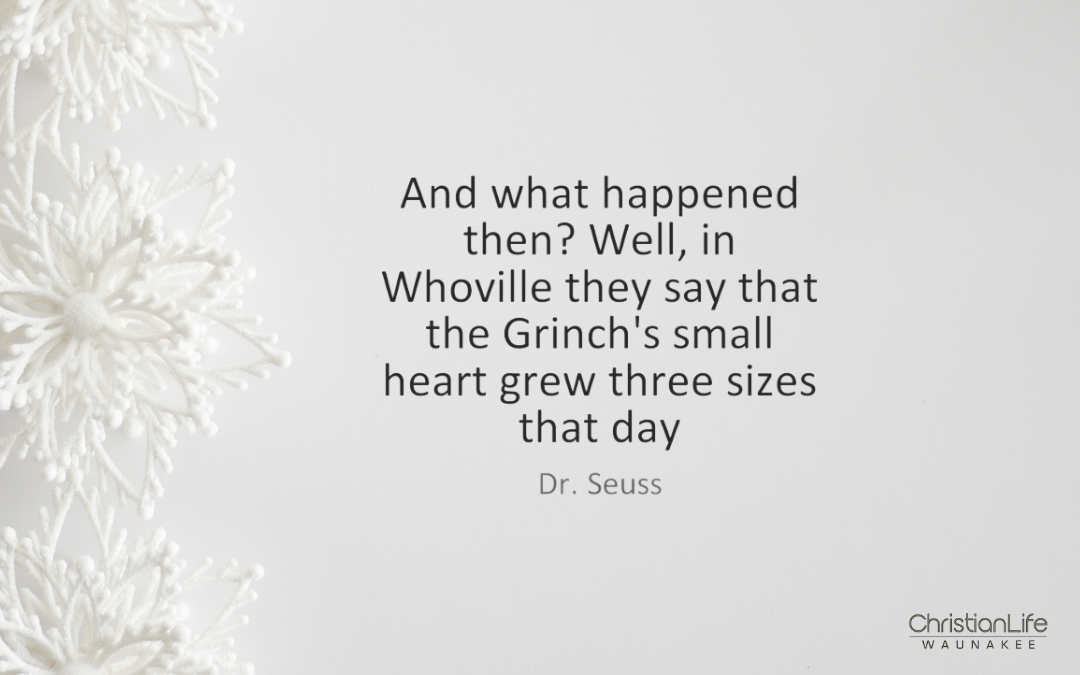“Whatever the reason, his heart or his shoes,
He stood there on Christmas Eve, hating the Whos”
Dr. Seuss’s How the Grinch Stole Christmas is a Christmas classic. The 1957 children’s book and its several screen adaptations have delighted kids and adults for years with the story of how the grumpy, Christmas-hating Grinch learns that Christmas isn’t all about material things. The Grinch is the protagonist of the story, and we love how his plot to “steal Christmas” results in his heart growing “three sizes” and eventually joining in the celebration. But the story couldn’t exist without the Grinch’s neighbors, the Whos. The Grinch hates them precisely because they love Christmas so much, and they annoy him with their present unwrapping, decorating, feasting, and, as the Grinch says, “The NOISE! NOISE! NOISE! NOISE!”
Watching their Christmas festivities from afar, the Grinch harshly pre-judges the Whos. Based on his observations, he sees them as gluttonous, noisy, shallow, and materialistic. They unwrap piles of presents and toys and make a lot of racket playing with them, they eat a lot, they SING! However, by the end of the story, the Grinch realizes he was wrong. Why? Let’s look at how the Whos handle being misunderstood and what they do that helps the Grinch become less grinchy.
Perspective
First, the Whos keep a proper perspective about what’s important, eventually demonstrating their actual values to the Grinch. Old Grinchy wants to “stop Christmas from coming” by taking away food, presents, decorations, etc., thinking the Whos will be devastated by this. As he successfully executes his plan, he leaves them with “nothing but hooks and some wire” and “a crumb that was even too small for a mouse.”
However, they’re not devastated. On Christmas morning, when the Grinch listens for the sound of violent BOO-HOO-ing, he hears merry sounds instead. Turns out, the Whos enjoy material things a lot (and who wouldn’t?), but they aren’t dependent on them for happiness. As a result, the Grinch realizes, all on his own, that Christmas “doesn’t come from a store. Maybe Christmas…perhaps…means a little bit more.”
“Do not store up for yourselves treasures on earth, where moths and vermin destroy, and where thieves break in and steal. But store up for yourselves treasures in heaven, where moths and vermin do not destroy, and where thieves do not break in and steal.” (Matthew 6:19- 20, NIV)
Kindness
Second, the Whos are untiringly kind and welcoming toward the Grinch, despite his opinion of them. The original book doesn’t show many direct interactions between the Grinch and the Whos, but the 2018 film version imagines a larger cast of characters. In this version, the kindness of the Whos is shown best by Mr. Bricklebaum, the Grinch’s nearest neighbor who insists on being neighborly no matter how many times the Grinch rebuffs his friendship, and by Cindy-Lou Who, who invites the Grinch to dinner after he admits that he “stole” Christmas. Arguably, this kindness makes it much easier for the Grinch to change his ways. Once he repents of his hatred, there’s a community ready and willing to welcome him. If they had repaid his prejudice with hatred of their own, the Grinch might have had some justification for his attitude. Instead, his meanness is met with nothing but grace.
“If your enemy is hungry, feed him; if he is thirsty, give him something to drink; for by so doing you will heap burning coals on his head.” (Romans 12:20, NIV)
Joy
Third, the Whos demonstrate a joy that transcends what they have materially. This joy can’t be destroyed by what the Grinch thinks or does. The Grinch wrongly assumes that the Whos’ Christmas joy is caused by the number of presents they get or the good food they get to eat. If he takes that away, he thinks, he will take away the Whos’ joy. Instead, after waking up in their empty houses, “Every Who down in Who-Ville, the tall and the small, was singing! Without any presents at all!” The Grinch realizes that their contentment and joy comes from something beyond what he can’t see. As a result, the Grinch wants what they have, spurring the change in him.
“Rejoice in the Lord always. I will say it again: Rejoice!” (Philippians 4:4, NIV)
Forgiveness
Finally, the Whos readily forgive the Grinch once he admits his wrongness and takes steps to repair the damage he’s done. Far from holding a grudge, they even offer him a place of honor: “…HE HIMSELF…! The Grinch carved the roast beast!” Even though he had hated them for no reason, they invite him to their table and give him a responsibility usually reserved for leaders or special guests. Because of their actions, their enemy has become their friend.
“For if you forgive other people when they sin against you, your heavenly Father will also forgive you.” (Matthew 6:14)
There’s another group in our world today that is often perceived wrongly: the Church. Just as the Whos were seen as gluttonous, materialistic, and shallow, some people may see the Church as stern, unloving, ignorant, and silly. While we need to acknowledge and correct any faults that we do have, we will often be judged unfairly by those who don’t understand what we’re all about. For a long time, we’ve enjoyed a culture whose values nominally aligned pretty closely with the Christian faith. However, our culture’s values are currently departing from ours. When people hate us, we have the option to hate back or respond the way the Whos did: with a healthy perspective, kindness, joy, and forgiveness.
“Live such good lives among the pagans that, though they accuse you of doing wrong, they may see your good deeds and glorify God on the day he visits us.” (1 Peter 2:12)
- Seuss. How the Grinch Stole Christmas. Random House, 1957.
- The Grinch. Directed by Yarrow Cheney and Scott Mosier, starring Benedict Cumberbatch, Illumination, 2018
—————————————————

